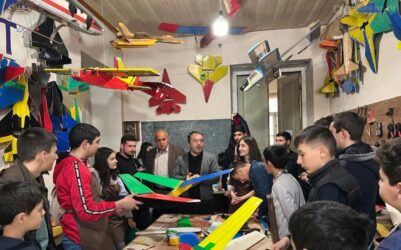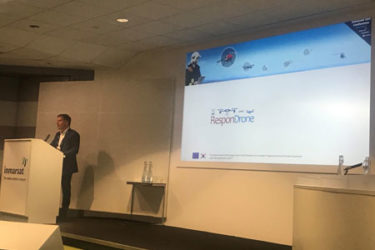Drones rapidly emerging as the dominant platform in the war on the Coronavirus
March 30, 2020
“When the going gets tough the tough get going“, is an old motivational adage, often linked to the world of sport, but one that aptly sums up the spirit of humanity in the face of adversity, and it may provide us with a sorely needed ray of optimism in the global crisis sparked by the spread of the Coronavirus.
Moreover, if “necessity is the mother of invention”, then the Coronavirus has certainly moved many people to bring the best out of themselves, as every day we are witness to a constant stream of diverse and innovative efforts to find cures for the virus, and to develop new or adapt existing technology and methodology to contend with it.
Drones have already begun to emerge as the “star performer” in the ongoing worldwide efforts to contain the spread of the Coronavirus. To date, the main focus has been that of law enforcement agencies to enforce social distancing, a key initiative in the endeavour to reduce the damage caused by the COVID-19 virus.
Drones as a tool for enforcing lockdowns
There is perhaps no more relevant a platform for dealing with such a situation than the EU-funded ResponDrone Project. ResponDrone members from across Europe have highlighted just how drones are now being adopted by EU states to spearhead the fight against this invisible enemy:
- Italy – Local police in Italy have been authorised by the Italian Civil Aviation Authority (ENAC) to use drones to monitor the movements of citizens during the Coronavirus pandemic. ENAC say they can be used in “urban areas” or “where there are small populations exposed to the risk of impact“.
- France – Police in Nice have already deployed drones to accompany police and serve as warning loudspeakers to enforce the Coronavirus lockdown.
- UK – Police are set to use drones to look for Coronavirus lawbreakers and enforce the lockdown. Northamptonshire Police says it will use eight drones, controlled by trained officers on the ground, to help prevent the spread of COVID-19. The drones will be used as a medium to instruct people to go indoors if they are breaking the law.
- Greece – The Civil Protection Department of the Regional Authority of Central Macedonia is using its drones to help enforce the confinement measures in Thessaloniki, its capital and second largest city in Greece.
- Belgium – Police in Brussels have begun using drones to keep a check on parks and other open spaces.
Using drones for measuring body temperature
In Bulgaria, the authorities have begun to use drones equipped with a thermal camera to detect people in public spaces with high-temperatures. This is an important tool for enabling the enforcement of quarantine requirements, and thus it may reduce the potential of community-wide infection. This has already proved to be successful in Burgas.
“The drone’s first attempt proved successful. In one densely populated area heat chamber detected four people with fever,” explained Burgas Mayor Dimitar Nikolov. “The location of two of them was crosschecked with addresses submitted to us for mandatory quarantine.”
Remote operating capability
As the health and safety of first responders is of paramount concern at a time like this, remote piloted technology has a clear advantage. ResponDrone Project coordinator Joonas Lieb, from the German Aerospace Center (DLR), has elucidated on just how the project has a significantly relevant potential to contribute to this crucial need.
The government of China is deploying drones in urban areas in order to spray disinfectants over closed markets, parks and public spaces. In a similar manner, the ResponDrone platform is able to deploy multiple drones simultaneously above an isolated or infected area by a single piloting team based in a location, at a safe distance from an infected area.
The core of the ResponDrone platform is established on a web-based cloud technology enabling operators to navigate the drones remotely, as well as to gather, store and distribute the collected data to all stakeholders involved (e.g. piloting team, healthcare agents, crisis management experts or government officials).
In a healthcare crisis situation, such as we are facing now, the remote operability of ResponDrone via regional control centre facilities, situated in safe, remote locations, could be of vital importance to providing solutions in the field while safeguarding medical teams, a key issue that has proved to be highly problematic all over the world.”
Lieb also points out other potential scenarios for the employment of ResponDrone in the current battle against COVID-19:
- Delivery of medical equipment to healthcare teams.
- Distribution of valuable information to the public.
Even if the project succeeds in implementing only some of its inherent potential, the benefit to society as a whole could be immeasurable.



